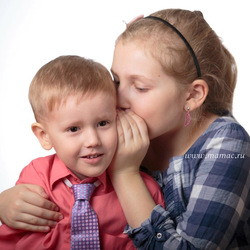How to raise a child with normal self-esteem
 Modern mothers today devote much more time to babies than before. They play with children, use different teaching methods and buy educational toys. All this, of course, is beneficial and beneficial for the child. Just by paying a lot of attention to the development of the baby, we often miss the formation of him as a person.
Modern mothers today devote much more time to babies than before. They play with children, use different teaching methods and buy educational toys. All this, of course, is beneficial and beneficial for the child. Just by paying a lot of attention to the development of the baby, we often miss the formation of him as a person.
We do not pay due attention to the communicative skills of the child and to adequate self-perception. Galka-Igryka will tell you how to instill a child with a worthy self-esteem and teach him to feel comfortable in society.
What does self-esteem affect
The child’s attitude to himself influences his cognition, behavior, personality development and various qualities in him.
Heightened self-esteem. In children with high self-esteem, there is high physical activity and curiosity. They are happy to start new business, set themselves challenging tasks, but they rarely finish what they have begun to do. Such children, as a rule, are capricious and touchy, they are not aware of their own failures and mistakes, they are not good at making friends. A kid with high self-esteem does everything to draw attention to himself, often these are not entirely correct and useful actions. He will react very vehemently to every remark or prohibition, trying, by all means, to keep his attention on his person longer.
Low self-esteem. Children with low self-esteem is much more difficult to develop as a person. They are indecisive, touchy and restrained in movement, not confident, not communicative and emotionally closed. Such a child wants to be friends with peers, but is afraid. He is very hard to get used to new conditions and places, he is pre-set to fail in any business and undertaking. As a result of all this, peers cease to take it into account, considering it a weakling and a loser, which negatively affects the entire future life of a child.
Adequate self-esteem. Only a child with high, but not inflated self-esteem can become a full-fledged person, without fears and complexes. If self-esteem is at the right level, then the child is not difficult to communicate with peers, he adequately perceives comments and prohibitions. Such a child is actively developing emotionally, intellectually and socially, with little or no help.
How is the child’s self-esteem
Of course, self-esteem is formed from early childhood. And since the baby spends almost all his time in the family, this is where it happens. While the child is practically not affected by external factors: friends, kindergarten teachers and other people – everything depends only on the behavior of the parents.From an early age it is necessary to surround the child with care and love, to show him that he is important and needed. This is the basis of the basis for the self-esteem of each person; only in this way the child will be able to decide on some actions, will be able to overcome even the slightest difficulties that have appeared in his way. When a child is loved and properly praised at home, he wants to live up to his expectations. At these moments, the most important thing is not to expect too much from him. If a child does not succeed in something, it is important to let him know that he will definitely learn this, that there is nothing wrong with failure.
The basis for an adequate self-esteem of a baby is the calm respect, trust and understanding prevailing in the family. If there are problems with the attitude towards the child in the family, if the parents expect too much from the baby, or vice versa, they do not expect anything, this leads to the formation of the wrong attitude of the child towards himself.
Parental mistakes
Often, not noticeable to themselves, parents make many mistakes in education. For example, the desire to protect the child from problems, excessive care, leads to the fact that the child becomes dependent, he can not make decisions, afraid to make mistakes, which ultimately leads to low self-esteem. Also lead to it:
– excessive severity and authoritarianism;
– excessive expectations of parents to the baby;
– conflicting requirements;
– open messages to the child that he was not planning that he was not expected in the family;
– too “correct” upbringing, the desire to make the child perfect;
– constant anxiety for health;
– indifference and lack of due attention to the child.
As a result of such mistakes in upbringing, a child forms doubts in his abilities, anxiety, timidity and self-doubt, he is closed and constantly suppresses his desires and feelings. The baby forms a complex of its own inferiority, which pursues its entire future life.
To make a child’s self-esteem too high, even easier. All parents, of course, love their children, but in some families this love turns into adoration. The child is constantly praised for nothing, quickly satisfies all his needs and desires, makes his life easy and cloudless, he is not allowed to solve any problems and tasks. As a result, the child grows up with a firm belief that everyone around him must, that he is exceptional .



